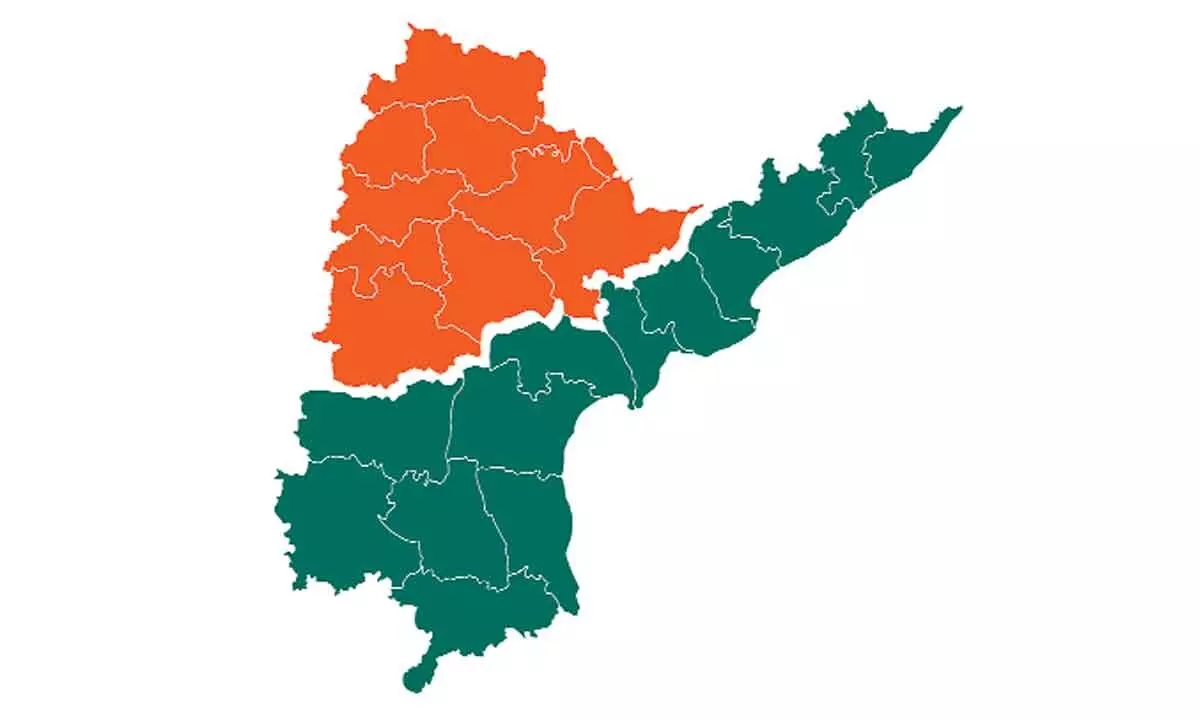Andhra Pradesh Bifurcation Issues – Revisited

A contentious area that still needs to be resolved pertains to Schedule 10 and Schedule 9 institutions and both these issues are presently pending with the Supreme Court for a final resolution since there is no agreement on the manner of division of these institutions by both these States
CENTRE HAS DONE ITS PART
• The Central government has all but fulfilled its promises under the State Re-organization Act. It gave a special package in lieu of special category status which is no longer special.
• It set up all institutions except a petro varsity which is stuck up due to land allocation issues.
• No issue is pending with the Centre.Some issues are in litigation and courts
• State bloated revenue gap funding to Rs 16,000 crore, but Centre restricted it to about Rs 5,000 crore
• A special development assistance being provided to Rayalaseema and North Coastal Andhra
• Rs 2,500 crore funds disbursed for Secretariat, High Court and Assembly
• Modernisation of the airports of Vijayawada, Visakhapatnam and Tirupati executed
• Railway zone is under implementation. Vizag Chennai industrial corridor made functional.
• After giving up Dugarajapatnam Port due to environment issues, Centre wanted to finance Ramaiahpatnam Port, but AP made it a minor and took up its development on its own
• Metro rail facility both in Vijayawada and Vizag are pending for want of project reports from AP
• Instead of a separate refinery at Kakinada, Centre investing in expansion of the refinery at Vizag. The State government on its own roped in a private enterprise to set up Kadapa steel factory.
Recently a former Member of Parliament UndavalliArun Kumar stirred a hornet's nest when he held a press conference and requested the Andhra Pradesh State government to take a stand in the Supreme Court in a writ petition filed by him, challenging the Andhra Pradesh state bifurcation. Though he also concedes the clock cannot be put back and division of the state is a settled matter, he feels examination of the process of bifurcation by the Supreme Court would at least help in establishing norms for any future state bifurcation. His sincerity on the issue cannot be doubted and he is fighting a lone battle to establish that the process of division of the state was legally faulty.
Responding to UndavalliArun Kumar,Sajjala Ramakrishna Reddy,Advisor to the Chief Minister, skirted the issue by claiming that their party stands for United Andhra Pradesh. Arun Kumar referred to the pending bifurcation issues and found fault with the State government for not pursuing for their resolution with the central government. The bifurcation issues are raised periodically by both the regional parties and local media to corner the BJP. Now that it has been 8 years since the bifurcation of the state, let us examine here what were the issues what were the promises and how far they have been sorted out and promises fulfilled.
Bifurcation issues can be broadly categorised into two. The issues pertaining to the division of assets between the states of Andhra Pradesh and Telangana and the fulfillment of promises as made in the AP State Reorganization Act.
Division of staff between the states of Telangana and Andhra Pradesh is more or less over and is settled. There was a hitch in the division of the employees of power utilities, more so with the intervention of the unions but even that is now finally settled with the intervention of the Supreme Court and findings of the DharmadhikariCommission. Debt is also apportioned. The other contentious area still to be resolved pertains to Schedule 10 and Schedule 9 institutions and both these issues are presently pending with the Supreme Court for a final resolution since there is no agreement on the manner of division of these institutions by both these States and may get resolved shortly. What needs to be resolved is with reference to the assets of the headquarters of these organisations. The field offices are already functioning in the jurisdictions of the respective bifurcated State governments. Division of water resources allocation of river flows between the states is the most contentious issue and may take some more time before it is finally resolved at the level of the tribunals or the Supreme Court. All the bifurcation issues today are at different levels of litigation in the courts and the final settlement has to come through court orders and are not pending for resolution at the Centre.
This brings us to the other parts of the bifurcation act where certain promises were made to the bifurcated state of Andhra Pradesh. A set of educational institutions were promised to be established over a period of 10 years but the central government took care to establish them in a record time frame of five years. All of them are established and functioning except the Petroleum University which seems to have been stuck at the stage of land allocation.
The AP Reorganization Act envisages financial assistance from central government for the revenue gap for the year 2014-15,consequent on bifurcation of the state since the revenue gap funding from 2015 onwards is covered by the terms of references (ToR) of 14 Finance Commission. The State government tried to push under this revenue gap expenditure incurred by them on their pet schemes, bloating this up to an amount of Rs 16,000 crore. The Central government restricted the amount to about Rs5,000 crore which was the deficit arising out of the bifurcation of the state and paid that amount. Promise was made to give a special package to the backward districts of Rayalaseema and North Coastal Andhra.A commitment of Rs2,100 crore is given and Rs1,750 crore is already disbursed. Disbursement of the balance amount is pending for submission of utilisation certificate by the state government. An attempt is made to draw a parallel with Bundelkhand package to this backward area development programme. Bundelkhand package includes all the ongoing schemes in those area in addition to the specific district-wise grant. If the other Central government schemes under operation in these seven districts are added up to this grant of Rs2,100 crore, this also becomes equal to the Bundelkhand package. And amount of Rs2,500 crore is allocated for the building of Secretariat, High Court and Legislative Assembly in the new capital city and also stands disbursed.
The most contentious issue which has also become an emotional issue of the state bifurcation is the Special Category Status. This is not part of the AP State Re-organisation Act but a promise made on the floor of the parliament by the then Prime Minister Manmohan Singh. The promise was to "extendSpecial Category Status for the purpose of Central assistance to put the state finances on a firmer putting." Industrial incentives for the North Eastern states were never part of the SCS nor were they mentioned by the Prime Minister Manmohan Singh in his statement in the parliament. General perception gained ground that special category status would automatically result in extending industrial incentives on a par with the North Eastern States. Consequent on the recommendations of the 14 Finance Commission wherein the distinction between SCS and others is removed, the Central government offered a special package, giving to the Andhra Pradesh same benefits which are made available to North Eastern States under a special package programme, which was agreed to and accepted by then Chief Minister N Chandrababu Naidu, who subsequently took a U-turn on this issue. Since politically it serves the purpose of both Telugu Desam and YSRCP, both parties are keeping this matter alive. In the process, the state is losing by not claiming amounts due to it under the special package.
The other promise was to establish and in certain cases examine the financial viability of starting certain projects. As part of this, the modernisation of the airports of Vijayawada, Visakhapatnam Tirupati is done by the central government. Railway zone though delayed is presently under implementation.Vizag Chennai industrial corridor is also made functional.
In the place of Dugarajapatnam Port, which was stuck due to environmental issues, the Central government was willing to finance RamaiahpatnamPort, but for reasons best known to themselves, the State government of Andhra Pradesh declared the RamayapatnamPort as a minor port and started the work of establishing the port. Though it was for the Central government to take up and complete the Polavaram project, the then CM volunteered to take it up and complete it. The Central government is funding the project as required but the execution of the project is stuck today due to technical issues. The AP Reorganization Act also provides for establishing metro rail facility both in Vijayawada and Vizag and both are pending for want of submission of project reports by the state government.
The AP Reorganization Act envisages examining the financial feasibility of establishing a steel plant in Kadapa and a petrol refinery at Kakinada. Both the projects have been technically examined and found to be economically not feasible. Instead of a separate refinery at Kakinada, the central government is investing in expansion of the petrol refinery at Vizag. The State government on its own has located a private enterprise who are willing to set up the Kadapa steel factory. The present government at the Centre as a matter of its policy is not establishing any public sector undertaking anywhere in the country, whether profitable or not profitable, since it considers running business enterprises is not the business of the government. Hence expecting the central government to start steel factory and a refinery that too after it is established starting them is not economically feasible may not yield any results. Further even the State ReorganisationAct also talks of examining the feasibility of establishing such commercial enterprises. Wherever the act provided for establishing institutions like in the case of the education institutions, the central government has acted upon. These are the two main promises of establishment a steel factory in Kadapa and a crude oil refinery at Kakinada which are pending out of the promises made in the AP Re-organization Act. The Central government has given to the state a number of infrastructure projects both under the railways and national highways since infrastructure is the focus area for the government. If the state government can quantify the investments required for both the refinery as well as the steel plant and makes request for additional funds under the different infrastructure projects of the central government, there can be possibility of accessing additional financial assistance from the central government, equivalent to the investments that would have come for the steel factory and the refinery.
But something like that to happen the state government should be prepared to look for a solution to the problem. Whether it was Chandrababu Naidu earlier or Jagan Mohan Reddy now have a vested interest in allowing these bifurcation issues to linger on and keep taking advantage of the same politically as and when required. Till this attitude of both these regional parties continues bifurcation issues will be brought to the centre stage as is politically convenient for them however much the central government may do as part of the reorganization act or beyond for the overall development of the state.
(Writer is a BJP leader)














